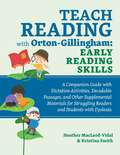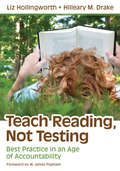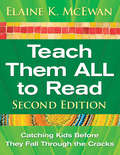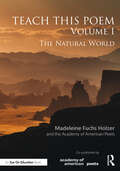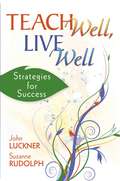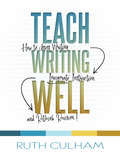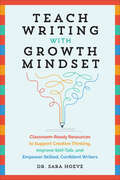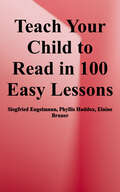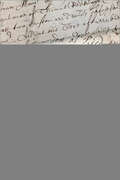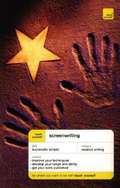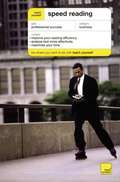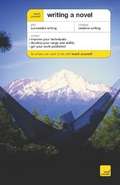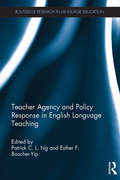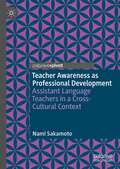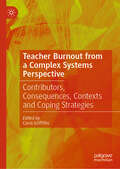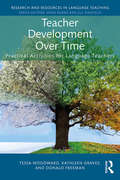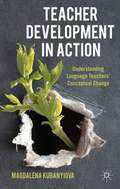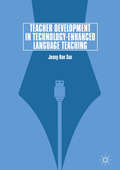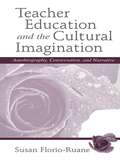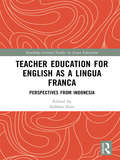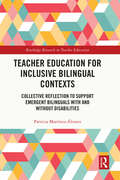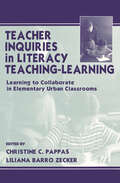- Table View
- List View
Teach Reading with Orton-Gillingham: A Companion Guide with Dictation Activities, Decodable Passages, and Other Supplemental Materials for Struggling Readers and Students with Dyslexia
by Kristina Smith Heather MacLeod-VidalA Simon & Schuster eBook. Simon & Schuster has a great book for every reader.
Teach Reading, Not Testing: Best Practice in an Age of Accountability
by Professor Liz Hollingworth Hilleary M. DrakeTeaching IS rocket science—and you are the pilot! The authors reinforce what teachers already know—test preparation worksheets and drill-and-kill activities do not make children into lifelong readers. This book’s conscientious approach to reading instruction combines an insider perspective on the development of high-stakes tests with classroom experience in achieving successful reading outcomes at the elementary and secondary levels. Their research-based methodology is based on five key components: Aligning instruction to the state or national core standards Using formative assessment Connecting units to real-world contexts Motivating students effectively Holding on to best practice in literacy instruction
Teach Them ALL to Read: Catching Kids Before They Fall Through the Cracks (2nd Edition)
by Elaine K. McEwan-AdkinsFeaturing vignettes, graphic organizers, instructional strategies, up-to-date research, and more, this updated bestseller helps educators understand the most effective ways to teach all students to read.
Teach This Poem, Volume I: The Natural World
by Madeleine Fuchs Holzer The Academy of American PoetsInstill a love of poetry in your classroom with the illuminating and inviting lessons from Teach This Poem classroom activities. Co-published with the Academy of American Poets, the leading champion of poets and poetry in the US, this book is an accessible entry-point to teaching poetry and fostering a poetic sensibility in the classroom.Each lesson follows a consistent format, with a warm-up activity to introduce the chosen poem, pair-shares, whole class synthesis, related resources, oral readings, and extension activities. Curated by the AAP, the poems are chosen with an eye toward fostering compassion and representing diverse experiences. Understanding that poetry is a powerful way of seeing the world, the volumes are organized thematically: Volume I is centered on the natural world and Volume II on equality and justice.Aligned with current standards and pedagogy, the lessons in this poem will inspire English teachers and their students alike.
Teach Well, Live Well: Strategies for Success
by John Luckner Suzanne RudolphTeaching is a highly rewarding—and highly demanding—profession. Honoring educators for the invaluable work they do, this unique resource provides critical information about being a highly competent teacher while living a rewarding, satisfying life outside of work. New and experienced teachers will find a unique collection of strategies for developing essential skills for being masterful in teaching and in life. Focused on preparation and effective teaching techniques, this nuts-and-bolts volume helps teachers find the right balance between personal and professional priorities and covers a wide range of topics, such as: •Increasing their teaching effectiveness •Improving their ability to collaborate with others •Developing self-care strategies for a vibrant personal and professional life Featuring “bottom line” tips, reproducibles for teacher reflection and support, and up-to-date resources, Teach Well, Live Well is an essential tool for educators looking to enjoy vibrant, productive careers and lives.
Teach Writing Well: How to Assess Writing, Invigorate Instruction, and Rethink Revision
by Ruth CulhamAsk great writers what the key to writing well is and they will tell you revision. Author Ruth Culham, both a successful writer and writing teacher, understands the challenges elementary teachers face when teaching writing and revision and now shares her knowledge in Teach Writing Well: How to Assess Writing, Invigorate Instruction, and Rethink Revision. Divided into two parts, Culham&’s book provides ways to teach that are both accessible to the teacher and student. You will find techniques to assess writing that are practical, and results driven. Inside you&’ll discover: Culham&’s traits of writing and how to use them to read and assess student work Ways to guide revision decisions using these traits as common language How to address challenges students may face within the different modes of writing (narrative, expository, and persuasive) Strategic lessons to teach the writer that scaffold students towards making their own craft decisions A chapter on mentor texts which can be used to model traits and key qualities for your students Teach Writing Well pulls best practices together and shows writing with fresh eyes.
Teach Writing with Growth Mindset: Classroom-Ready Resources to Support Creative Thinking, Improve Self-Talk, and Empower Skilled, Confident Writers (Teach Writing With Growth Mindset Ser.)
by Sara Joy HoeveSet students up for a lifetime of writing success with activities and strategies for supercharging creativity, supporting engagement, and boosting confidence in an easy-to-use resource made just for busy teachers. Created for busy classroom teachers, this resource provides classroom strategies and writing activities you can immediately adapt and integrate into any classroom routine. Following a foreword by bestselling author of The Growth Mindset Coach Annie Brock, each chapter provides new tips and tricks to transform the culture of a writing classroom and convince students to finally let go of the “bad writer” label! Inside you’ll find: Writing exercises to build confidence and skill Teaching tips for inspiring successful young writers Lesson plans for integrating the growth mindset into your classroom And much more! This resource provides teachers with both the research-based pedagogy and the specific growth mindset strategies to foster positive writing identities in students of all ages. Let Teach Writing with Growth Mindset inspire you to make positive change in your students!
Teach Your Baby to Read: The Gentle Revolution
by Glenn DomanThe effect of this book may well mark a turning point in the education of our children. Glenn Doman's work in teaching children to read at a very young age is fascinating and it is to be welcomed. The younger we are, the easier we often find it to learn, and there is no reason to deny children the opportunity to learn to read while they are still very small. Why should we limit our children to television and comic strips when reading may be well within their grasp, can give them such pleasure, and is so vital for their education?
Teach Your Child to Read in 100 Easy Lessons
by Siegfried Engelmann Phyllis Haddox Elaine BrunerIs your child halfway through first grade and still unable to read? Is your preschooler bored with coloring and ready for reading? Do you want to help your child read, but are afraid you'll do something wrong? <p><p>RAs DISTARreg; is the most successful beginning reading program available to schools across the country. Research has proven that children taught by the DISTARreg; method outperform their peers who receive instruction from other programs. Now for the first time, this program has been adapted for parent and child to use at home. <p><p>Teach Your Child to Read in 100 Easy Lessons is a complete, step-by-step program that shows parents simply and clearly how to teach their children to read. Twenty minutes a day is all you need, and within 100 teaching days your child will be reading on a solid second-grade reading level. It's a sensible, easy-to-follow, and enjoyable way to help your child gain the essential skills of reading. Everything you need is here -- no paste, no scissors, no flash cards, no complicated directions -- just you and your child learning together. <p><p>One hundred lessons, fully illustrated and color-coded for clarity, give your child the basic and more advanced skills needed to become a good reader. Teach Your Child to Read in 100 Easy Lessons will bring you and your child closer together, while giving your child the reading skills needed now, for a better chance at tomorrow.
Teach Yourself Baby Names
by Victoria WilsonThis book contains more than 7,000 names from every origin, from Celtic and Sanskrit to brand-new names for the 21st century.
Teach Yourself Linguistics
by Jean AitchisonThis book is to help people working by themselves to break into the 'charmed circle' of linguistics. It explains basic concepts and essential terminology. It is not a bedside reading book, and contains no chatty anecdotes. It is a straightforward handbook for those who wish to know about the subject. Linguistics is a highly technical field, and technical vocabulary cannot be avoided.
Teach Yourself Palaeography: A Guide for Genealogists and Local Historians
by Claire JarvisThis is the very first 'teach yourself' book on palaeography, covering all the skills that the genealogist needs to read any document that might be found at any date in English archives.Using a series of graded exercises in transcription, Teach Yourself Palaeography works backwards in time in easy stages from the modern handwriting of the nineteenth century to the court hands of the medieval period, focusing on records that are of particular interest to family and local historians.The book provides a unique, self-contained reference guide to palaeography, and to all the different letter forms, symbols and abbreviations that have ever been used in English records.
Teach Yourself Screenwriting
by Raymond G. FrenshamMany readers dream of seeing their stories on the silver screen, but most do not know how to write a screenplay, let alone get their script into the right hands. For those readers wanting the "how-tos" of Hollywood, Teach Yourself Screenwriting is an easy-to-comprehend yet thorough introduction to this art. Here they will get the basics and advice on how to get their work onto celluloid. This book covers the techniques and specialized skills used in writing for this visual medium and answers the practical questions often asked by budding screenwriters.
Teach Yourself Speed Reading
by Tina KonstantSpeed-reading is about reading--and being able to recall--more written information in less time. Following a unique five-step system, this practical guide teaches readers the basics of speed-reading in less than an hour. It includes tools and information on a variety of reading and memory techniques that allow readers to start using and practicing the techniques as they read--and therefore finish this book in a fraction of the time they would have taken previously. The book shows how to read effectively under pressure and concentrate in today's noisy, distracting environments.
Teach Yourself Writing a Novel
by Nigel WattsSuccessful author and veteran writing teacher Nigel Watts walks you through the novel-writing process--from germinating an idea, through developing plot, character and theme, to finding an agent and contacting publishers. He also provides priceless pointers on how to get started and keep the momentum going and how to conquer writer's block. Each chapter features examples from some of the greats along with skill-building exercises. This new edition contains fully updated listings of writing courses and additional resources not found in the previous edition.
Teacher Agency and Policy Response in English Language Teaching (Routledge Research in Language Education)
by Patrick C. Ng Esther F. Boucher-YipThe role of English in the global arena has prompted official language-in-education policy makers to adopt language education policies to enable its citizens to be proficient in English and to access knowledge. Local educational contexts in different countries have implemented English education in their own ways with different pedagogical goals, motivations, features and pedagogies. While much of the research cited in English language planning policy has focused on macro level language policy and planning, there is an increasing interest in micro planning, in particular teacher agency in policy response. Individual teacher agency is a multifaceted amalgam, not only of teachers’ individual histories, professional training, personal values and instructional beliefs, but also of how these interact with local interpretations and appropriations of policy. Teacher Agency and Policy Response in English Language Teaching examines the agency of the teacher in negotiating educational reforms and policy changes at the local and national levels. Chapters in the book include: English language teaching in China: teacher agency in response to curricular innovations Incorporating academic skills into EFL curriculum: teacher agency in response to global mobility challenge Teacher agency, the native/nonnative dichotomy, and "English Classes in English" in Japanese high Schools Teacher-designed high stakes English language testing: washback and impact This book will appeal to researcher across all sectors of education, in particular key stakeholders in curriculum and language planning. Those interested in the latest development of English language teaching will also find this book a valuable resource.
Teacher Awareness as Professional Development: Assistant Language Teachers in a Cross-Cultural Context
by Nami SakamotoThis book examines the process of identity (re)construction for assistant language teachers (ALTs) in foreign language classrooms in Japan, using Narrative Inquiry as a tool to provide a multifaceted perspective on their personal and professional growth. To develop a thorough understanding of the classroom, the author proposes three different types of awareness from the perspective of sociocultural theory. Each type of awareness is a unique lens through which to see the teachers’ world of language teaching within the classroom. Finally, the book discusses teacher development, teaching theory, and identity based on analysis of the narrative data. The book offers useful pedagogical insights that may have implications for teacher development and principles of language team teaching for teachers, teacher trainers, ALTs, boards of education, and university students of English and language education, including English as a Foreign Language (EFL).
Teacher Burnout from a Complex Systems Perspective: Contributors, Consequences, Contexts and Coping Strategies
by Carol GriffithsThis edited book investigates the factors contributing to teacher burnout and its potential consequences. Topics include the relationship of burnout to cultural identity, modality and job satisfaction, and chapters discuss various settings such as the English as a Medium of Instruction (EMI) classroom, secondary and primary schools. The book aims to provide possible solutions and ways forward for tackling the issue of burnout, both at a personal and systemic level. It will be of interest to students and scholars in the fields of teacher education, wellbeing, school and schooling, as well as practising teachers and school leadership.
Teacher Development Over Time: Practical Activities for Language Teachers (Research and Resources in Language Teaching)
by Tessa Woodward Kathleen Graves Donald FreemanTeacher Development Over Time: Practical Activities for Language Teachers addresses teacher learning over the span of the careers of both novice and experienced teachers in English Language Teaching (ELT). It is designed to a) help novice ELT teachers to see the ways in which their learning may open up careers and communities over a professional life span; and b) support experienced ELT teachers in understanding where they are in their careers and how they may respond creatively to the challenges in that particular career phase. Part 1 synthesises the views of major research on teaching as it is experienced over time by teachers and discusses the implications. Readers engage with these ideas via the activities in Part 2, which encourage them to reflect on their career paths and on possible themes for future work. Part 3 describes ways teachers can set the Part 2 activities within a busy professional life, and Part 4 helps teachers to engage in further explorations on their own or with others. By merging a strong line of research with very practical tools for understanding professional development, Teacher Development Over Time proves to be an indispensable resource for language teachers as well as teacher educators and mentors.
Teacher Development in Action
by Magdalena KubanyiovaTeacher Development in Action offers a rich account of language teachers' engagement with the latest research in second language motivation on a year-long teacher development project. It offers an in-depth analysis of how language teachers mobilize (or not) their vast inner resources when they make sense of new material, and sheds light on why language classrooms do not always become acquisition-rich and motivating environments, even when teachers show great interest in new ideas and find them highly relevant to their practice. Drawing on a grounded theory ethnographic study of EFL teachers in Slovakia, this book breaks new theoretical ground in the language teacher cognition domain and weaves together findings from field notes, classroom observations and interviews into an integrated model of Language Teacher Conceptual Change (LTCC). The new insights into the complex and dynamic nature of teacher development constitute an original contribution to the field of applied linguistics and have significant implications for second language teacher education and development.
Teacher Development in Technology-Enhanced Language Teaching
by Jeong-Bae SonThis book explores language teacher development in computer-assisted language learning (CALL) environments and discusses approaches, tasks and resources that can guide language teachers to develop their skills and strategies for technology-enhanced language teaching (TELT). It looks at key aspects of CALL in terms of pedagogy and technology and proposes a model of CALL teacher development, which incorporates essential elements of teacher learning in CALL. Further, the author presents practical tasks and tips on how to develop knowledge and skills for the use of digital technologies in language teaching and suggests ideas to improve language teacher training and development.
Teacher Education and the Cultural Imagination: Autobiography, Conversation, and Narrative
by Susan Florio-Ruane Julie deTarMaking culture a more central concept in the texts and contexts of teacher education is the focus of this book. It is a rich account of the author's investigation of teacher book club discussions of ethnic literature, specifically ethnic autobiography--as a genre from which teachers might learn about culture, literacy, and education in their own and others' lives, and as a form of conversation and literature-based work that might be sustainable and foster teachers' comprehension and critical thinking. Dr. Florio-Ruane's role in the book clubs merged participation and inquiry. For this reason, she blends personal narrative with analysis and description of ways she and the book club participants explored culture in the stories they told one another and in their responses to published autobiographies. She posits that autobiography and conversation may be useful for teachers not only in constructing their own learning about culture, but also, by doing so, in participating in the transformation of learning within the teaching profession.
Teacher Education for English as a Lingua Franca: Perspectives from Indonesia (Routledge Critical Studies in Asian Education)
by Subhan ZeinThis edited collection responds to a gap in the literature by presenting a much-needed examination of both the theoretical and practical aspects of teacher education for English as a lingua franca in Indonesia. Through a series of extended research-based and conceptual chapters written by experts in teaching English to speakers of other languages (TESOL) in and about Indonesia, this book offers an insight into Indonesia’s unique cultural, social and institutional contexts. The content focuses on four interrelated themes: the transition of perspective from English as a foreign language (EFL) to English as a lingua franca (ELF); the knowledge base of ELF pedagogy; teacher agency and identity in ELF; and innovations in teacher education for ELF. This book is highly relevant to English teachers, teacher educators and scholars worldwide aspiring to broaden their horizon and professionalism in the teaching of ELF.
Teacher Education for Inclusive Bilingual Contexts: Collective Reflection to Support Emergent Bilinguals with and without Disabilities (Routledge Research in Teacher Education)
by Patricia Martínez-ÁlvarezThis text demonstrates how collective reflection can function as a central part of effective teacher preparation for work in inclusive bilingual environments. Through analysis of rich qualitative data, Teacher Education for Inclusive Bilingual Contexts shows how group reflection supports pre-service educators to recognize the intersectional challenges faced by students, and understand their identities beyond the confines of disability. This, in turn, engenders reconceptualization of standardized expectations and implicates the educator in developing student agency through individualized use of routine, language, and materials. The author offers Cultural Historical Activity Theory (CHAT) and Disability Studies in Education (DSE) as a basis for dialectal interactions to unearth contradictions and misunderstandings surrounding language acquisition and the learning of emergent bilinguals, and highlight the ways in which educators can disrupt oppressive practices through expansive learning practices. This insightful volume will be of interest to researchers, scholars, and postgraduate students in the fields of inclusive education and disability studies, bilingual and language education, and teacher education.
Teacher Inquiries in Literacy Teaching-Learning: Learning To Collaborate in Elementary Urban Classrooms
by Christine C. Pappas Liliana Barro Zecker Liliana ZeckerThis book consists of the reports of 13 urban elementary teacher researchers' year-long inquiries around literacy topics--conducted as part of a collaborative school-university action research project. The focus is on how they attempted to transform their teaching practices to meet the needs of students from diverse ethnic and linguistic backgrounds, and how their inquiry efforts resulted in developing more collaborative styles of teaching. These teachers explore how collaborative classroom interactions occur when teachers move away from teaching-as-transmission approaches to ones in which they share power and authority with their students--viewing them not as 'at risk' but instead as 'at promise.' Because the everyday interactions between teachers and students are realized by social talk in the classroom, classroom discourse was analyzed to study and document the teacher researchers' efforts to make changes in the locus of power in literacy teaching and learning. Their chapters are filled with classroom discourse examples to illustrate their points. The volume includes teacher inquiries conducted in elementary classrooms from kindergarten through eighth grade. Three took place in bilingual classrooms, one in a special education class. These inquires cover a range of literacy topics, including reading-aloud, language richness, writing, literature discussion groups, drama, and 'pretend' reading. The background and theoretical underpinnings of the project are discussed in an introduction written by the editors; in the conclusion they pull together the major themes in the teacher researchers' chapters and discuss the political implications of their efforts to change literacy teaching and learning in their urban classrooms.
